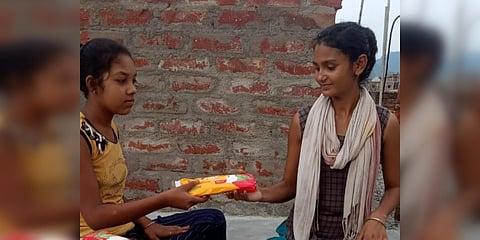

PATNA: Age is not an obstacle to do good work for society to a 19-year-old girl, living in the Naxal-affected areas of Bihar's Nawada district. At the age of 15, having seen the menstrual pains of a poor girl, she had bought some packets of sanitary napkins with her friends from a nearby market with pocket money and gifted them among girls of poor families of her village.
Since then, she has distributed more than 4000 pads of sanitary napkins among girls and women of localities free and at some cost through Sanitary Napkin Banks (SNBs). When she turned 19, she succeeded in setting up such SNBs at 27 places across the 16 panchayats of the Naxal-affected Rajauli block.
Mausam Kumari of Hardiya village in Nawada district had to face plethora of objections from family and others of locality in doing so but later, realising importance of services, her father Chhote Lal Singh - a truck driver, came forward and supported her.
And now she has become a torchbearer and a household name to other girls and women of villages on menstrual and family loaning issues. While she is pursuing graduation from KLS College in History, she is scripting history of social reforms by services.
During the last three months of COVID-19 lockdown, she with her team members-all girls of school and college-going, has distributed more than 600 napkin pads free among the women and girls of poor families in addition to making it available through SNBs at Rs 30 per packet.
"In 2015, having seen a poor girl in menstrual pain, I moved with an idea to set up a SNB. One day, I discussed this with my two neighbourhood girls namely Sweetly Kumari and Sania Kumari.We collected money from own pockets and started it at my home," she said.
She has formed a group of more than 16 girls, who are spreading menstrual hygiene education and supporting other women and girls in running banks in their areas. "I, then set up the first Sanitary Napkin Bank with a box and a register at my home. Upon knowing about it, local women and girls of my village started buying it. Gradually with profit earned from selling pads, I brought pads in bulk for sale and some times free to extremely poor girls," she said.
When the shopkeeper at Rajauli market knew about it, he gave her discounts on the packets of pads. It helped her a lot in increasing number of pads with profit money. "In 2017, a woman activist, working as cluster coordinator of Population Foundation India helped me. Now, the Gram Nirman Mandal of Shekho Das Ashram-set up by JP Narayan in 1952 has also come ahead and helping me besides the Population Foundation India," she said.
Delhi-based woman activist Neha Singh, who runs an NGO "Bleeding Blues" for supporting, educating and advocating for sexual reproductive, menstrual health and hygiene, provides 100 pieces of sanitary napkins free per month to Mausam.
"In the last three months of COVID-19 lockdown, more than 600 sanitary pads have been distributed free among women and girls of poor families in localities. She also educates women and girls of areas on family planning and provided them kits of family planning free with the help of local ASHA workers. Initially, when we went to houses of other women educating them on family planning or giving napkin, they used to shut the doors passing criticism on us," she said.
But now those who then rebuked and criticise her have started appreciating and helping. At her request, made to health minister, one 'Yuva Clinic' has been opened at block headquarter of Rajauli with a lady and a male doctors to counsel the girls and boys of their health related problems.
She said that she covers some times 8 to 10 kms of distance for meeting women and girls by foots, some tines by bicycles or some times by auto rickshaw. "We don’t have a scooty or other vehicle to move across the areas but we are continuing to make new healthy generation," she said.